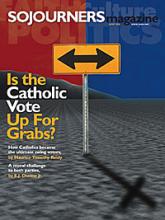Is there such a thing as the "Catholic vote"? Commonweal writer Maurice Timothy Reidy and Washington Post columnist E.J. Dionne Jr., both practicing Catholics and avid Catholic-watchers, dive into the fascinating swirl of Catholic theology and electoral politics. Reidy charts a historical route, mapping the political allegiances of Catholics throughout the last century, while Dionne offers an analysis of more recent elections. With midterm elections just around the corner, it's an important and invigorating discussion--for Catholics and non-Catholics alike.
Also invigorating are the conversations in these pages with Glenn Kumekawa and Marilynne Robinson. Kumekawa was a teenager when he and his family were sent to a Utah internment camp for Japanese Americans. He shares those experiences with associate editor Rose Marie Berger, including his later move to college where--interestingly--he was befriended by William Stringfellow, who went on to become an early Sojourners contributor and friend (and one of the most influential theologians in the country). Robinson, a Sunday school teacher and author of the Pulitzer Prize-winning novel Gilead, talks to Tom Montgomery-Fate about the connections between the creative process of religious faith and the creative process of writing. Both involve seeing the holy in everyday life.
Seeing the holy can sometimes involve seeing the "signs and wonders" of healing, a subject that provokes widely divergent views among Christians. Dee Dee Risher tackles a subject that's personally close to home, but also has significance for the wider church--particularly in the global South. But more important than Jesus' message of healing, she reminds us, is his command to love each other. Seeing the holy in each other, including our political opponents: Now there's a challenge.
The Editors
Read the Full Article
